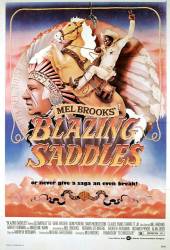Continuity mistake: When Mongo first comes into town and the man on the horse says "You can't park that animal here," Mongo punches the horse and its rider, and the horse falls. Before the cut to the close up of the man (obviously the stunt double), his head is facing toward the horse's head. After the cut to the close up of the man, his body is facing the opposite direction. (00:46:30)

Blazing Saddles (1974)
1 review
Directed by: Mel Brooks
Starring: Gene Wilder, Mel Brooks, Slim Pickens, Cleavon Little, Harvey Korman
Your rating
Average rating
(25 votes)
10/10.My favorite Mel Brooks movie.The hilarity's off the charts here.Movies like this deserve all the praise it got as it was big at the box office. Cleavon Little, Gene Wilder, Harvey Korman, Madeline, Kahn, Alex Karris, even Mel Brooks himself are all great here.A movie like this wouldn't be made or shown into the uber sensitive age we're living in now.Still I laugh at the pure genius of this movie and the comedic master behind it, Mel Brooks.
Bart: Well, can't you see that's the last act of a desperate man?
Howard Johnson: We don't care if it's the first act of "Henry V, " we're leaving!
Trivia: The late Richard Pryor, who helped write the screenplay, was originally supposed to play Bart. However, his controversial stand-up comedy routines made it difficult to secure financing. Cleavon Little was eventually cast in Pryor's place.
Question: At the beginning, Lyle refers to the song Camptown races as "The Camptown lady"? Is this simply cause he's stupid, or is there any other reason?
Join the mailing list
Separate from membership, this is to get updates about mistakes in recent releases. Addresses are not passed on to any third party, and are used solely for direct communication from this site. You can unsubscribe at any time.
Check out the mistake & trivia books, on Kindle and in paperback.




Chosen answer: The opening line of the song refers to the Camptown Ladies and the phrase "Camptown Races" never appears anywhere in the lyrics. If nobody told him otherwise, Lyle may simply have assumed that some variation on "Camptown Ladies" was the actual title.
Tailkinker ★
The actual title of the song was "Gwine to Run All Night, or De Camptown Races," written by American lyricist Stephen Foster and first published in 1850. Over many years on the minstrel show circuit, the title was shortened to "Camptown Races" and was sometimes erroneously called "Camptown Ladies." While the phrase "Camptown Races" doesn't appear in the lyrics, the phrase "Camptown Racetrack" does appear in the second line: "Camptown ladies sing dis song, doo-dah, doo-dah, Camptown Racetrack five miles long, oh-de-doo-dah-day." The song refers to Camptown, Pennsylvania, a real town with a popular horserace in the mid-1800s.
Charles Austin Miller